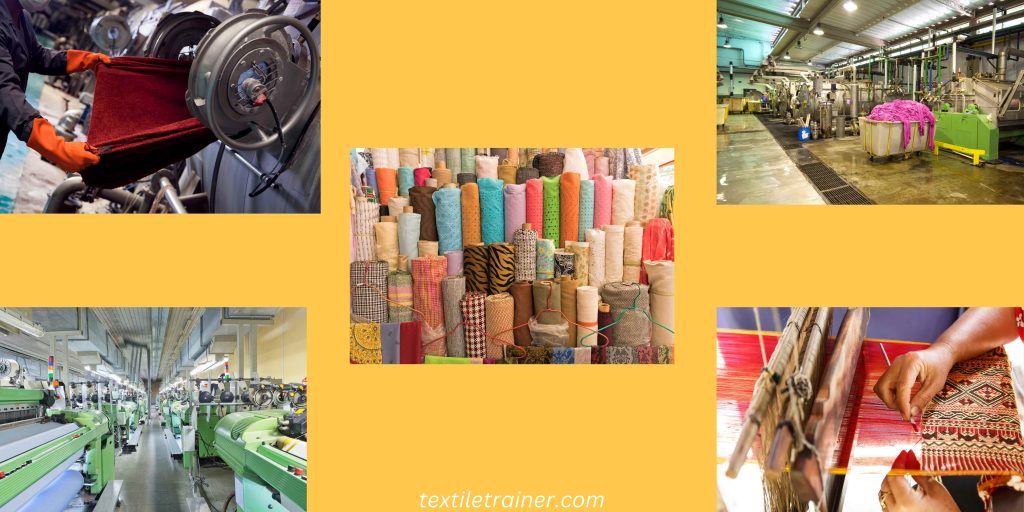Offline Quality Control:
Offline quality control refers to the process of evaluating the quality of a product or service after it has been produced, rather than during production. It involves a series of inspections, tests, and audits that are performed on a sample of the final product or service to ensure that it meets the required standards and specifications.
Offline quality control is typically conducted by a team of quality control professionals who use a range of tools and techniques to assess the product or service. These may include visual inspections, measurements, and performance tests. The results of the quality control checks are then used to identify any defects or areas for improvement, and to determine whether the product or service is fit for release to the market.
Online Quality Control:
Online quality control refers to the process of monitoring and controlling the quality of a product or service during the production process, rather than after it has been produced. It involves the use of real-time data and feedback to identify and correct any issues or defects that may arise during production.
Online quality control typically involves the use of sensors and automated systems to monitor key aspects of the production process, such as temperature, pressure, and product dimensions. These systems provide real-time data that can be analyzed to identify any deviations from the desired specifications, and to trigger automated responses, such as adjusting machine settings or stopping the production process.

Differences Between Offline and Online Quality Control are given below:
| Topic | Offline Quality Control | Online Quality Control |
| 1. Timing | Offline quality control is conducted after the production process is complete | while online quality control is conducted during the production process. |
| 2. Sampling | Offline quality control typically involves the inspection of a sample of the final product | while online quality control involves monitoring the entire production process in real-time. |
| 3. Focus | Offline quality control focuses on detecting and correcting defects in the final product. | online quality control focuses on identifying and correcting issues during the production process to prevent defects from occurring. |
| 4. Methodology | Offline quality control relies on manual inspections and tests | online quality control uses automated systems and sensors to collect real-time data. |
| 5. Speed | Offline quality control can take longer to detect and correct defects | online quality control can detect and correct issues in real-time, reducing the risk of defects and improving overall efficiency. |
| 6. Cost | Offline quality control may require more resources and can be more costly than online quality control. This is because offline quality control involves manual inspections and tests, which can be time-consuming and require skilled personnel. | In contrast, online quality control uses automated systems and sensors, which can be more cost-effective and require less manual labor. |
| 7. Scope | Offline quality control typically focuses on the final product or service | while online quality control can monitor the entire production process, including raw materials, intermediate stages, and final product. This means that online quality control can provide more comprehensive feedback on the production process and help identify areas for improvement. |
| 8. Integration | Offline quality control can be less integrated with other parts of the production process, such as process control and automation systems. | Online quality control can be more integrated with other parts of the production process, such as process control and automation systems. |
| 9. Accuracy | Offline quality control relies on samples that may not fully represent the entire production process. | Online quality control can provide more accurate and precise measurements than offline quality control. This is because online systems can collect real-time data and perform continuous measurements |
| 10. Response Time | Offline quality control may take longer to identify and correct defects, as it requires manual inspections and tests that may not be as immediate as online systems. | Online quality control can provide immediate feedback on the production process, allowing for quicker responses to issues and defects. |
Overall, while offline quality control is important for identifying and correcting defects in the final product, online quality control is becoming increasingly important in modern manufacturing and production processes as it allows for real-time monitoring and control, reducing the risk of defects and improving overall efficiency.







I truly appreciate this blog post.Much thanks again. Much obliged.
thanks for comments.
I really liked your blog article. Want more.
ok, I will try.
I loved your post.Much thanks again.
Thanks too..
Fantastic post.Really looking forward to read more. Keep writing.
Keep visit our site…
Awesome blog.Much thanks again. Fantastic.
keep visit our site… .
Very neat blog article.Really thank you! Really Cool.
keep visit our site…..
Thanks so much for the blog post.Really thank you! Awesome.
please share our article…
I loved your blog. Cool.
thanks..
Enjoyed every bit of your blog article.Really thank you! Keep writing.
keep visit our site.
Thanks-a-mundo for the article.Much thanks again.
Thank you ever so for you blog post. Keep writing.
Say, you got a nice post. Will read on…
wow, awesome blog.Thanks Again.
Thanks again for the article.Really looking forward to read more. Really Cool.
Thanks too…
Fantastic article.Thanks Again. Really Great.
keep visit our site.
Thanks for sharing, this is a fantastic blog post.Thanks Again. Fantastic.
keep visit our site…
Awesome article.Thanks Again. Really Great.
Very informative article.Really thank you! Much obliged.
I loved your blog post.Really looking forward to read more. Really Great.
Thank you ever so for you article post.Much thanks again. Will read on…
Thank you ever so for you blog post.Really thank you! Really Cool.
I appreciate you sharing this blog post.Thanks Again. Really Great.
I am so grateful for your post.Thanks Again. Awesome.
Thanks so much for the article.Really looking forward to read more. Cool.
Thanks so much for the article post.Really thank you! Much obliged.
Appreciate you sharing, great blog.Much thanks again. Keep writing.
Really appreciate you sharing this post.Really looking forward to read more. Awesome.
Fantastic blog post.Really thank you! Really Great.
Im obliged for the article.Thanks Again. Cool.
I am so grateful for your blog.Much thanks again. Will read on…
Really informative article post.Really looking forward to read more. Really Great.
Enjoyed every bit of your article.Thanks Again. Awesome.
Great, thanks for sharing this article post. Keep writing.
Very informative article. Fantastic.
Hey, thanks for the article.Much thanks again. Really Great.
Thanks for sharing, this is a fantastic blog post.Thanks Again. Will read on…
Thank you ever so for you blog post.Really thank you!
I really like and appreciate your article.Thanks Again. Great.
I cannot thank you enough for the article.Really looking forward to read more. Keep writing.
Thank you for your blog article.Really thank you! Awesome.
Looking forward to reading more. Great post.Really looking forward to read more. Fantastic.
I value the blog post.Much thanks again.
I really enjoy the post. Really Great.
I loved your article post. Want more.
A big thank you for your blog post.Much thanks again. Much obliged.
Say, you got a nice article post.Really thank you! Want more.
Thank you for your blog post.Really looking forward to read more. Cool.
Thanks for sharing, this is a fantastic article.Really looking forward to read more. Awesome.
Great, thanks for sharing this article. Great.
Enjoyed every bit of your blog. Great.
I really enjoy the blog post.Thanks Again. Will read on…
Major thankies for the article post. Will read on…
I really like and appreciate your post.Really looking forward to read more. Really Great.
Im thankful for the article.Thanks Again. Will read on…
Im thankful for the blog post.Thanks Again. Will read on…
wow, awesome article. Great.
Hey, thanks for the blog article.Much thanks again. Really Cool.
Very good post.Much thanks again. Awesome.
Say, you got a nice blog.Really thank you! Really Cool.
Great blog post.
This is one awesome article. Great.
I really liked your article post.Thanks Again.
Thanks for the post.Thanks Again. Cool.
I think this is a real great article post.Really looking forward to read more. Great.
Im thankful for the article post. Keep writing.
I loved your blog.Thanks Again. Keep writing.
Very neat post.Really looking forward to read more.
A round of applause for your blog.
Very good blog article.Really thank you! Really Great.
Great blog post.Much thanks again. Fantastic.
Thank you for your article. Much obliged.
I think this is a real great blog article.Really looking forward to read more. Really Great.
Thank you for your article. Cool.
Thank you ever so for you blog article.Really thank you! Keep writing.
I really liked your blog.Thanks Again.
Thanks for the article.
Thanks again for the blog article.Much thanks again. Really Great.
Thanks
Very informative blog post.Much thanks again. Awesome.
Thank you for your blog post.Thanks Again. Really Cool.
Thanks a lot for the article. Really Great.
Enjoyed every bit of your blog article.Really looking forward to read more. Great.
Really enjoyed this blog post.Thanks Again. Really Great.
I truly appreciate this post.Really looking forward to read more. Keep writing.
Im obliged for the blog post. Fantastic.
I loved your post.Thanks Again. Really Cool.
Thanks for the blog article.Really looking forward to read more. Awesome.
Thank you for your blog.Much thanks again. Keep writing.
Thanks for the blog post.Thanks Again. Cool.
Say, you got a nice blog post.Really thank you! Much obliged.
Great, thanks for sharing this article post.Really thank you! Keep writing.
Very neat article.Thanks Again. Really Great.
Thank you ever so for you article post.Thanks Again. Really Cool.
Thanks for the article post. Awesome.
Major thanks for the article post.Thanks Again. Fantastic.
Thanks again for the article post. Cool.
Im thankful for the blog. Want more.
Really enjoyed this blog.Really looking forward to read more. Really Great.
Enjoyed every bit of your post.
Kerassentials are natural skin care products with ingredients such as vitamins and plants that help support good health and prevent the appearance of aging skin. They’re also 100% natural and safe to use. The manufacturer states that the product has no negative side effects and is safe to take on a daily basis. Kerassentials is a convenient, easy-to-use formula. https://kerassentialsbuynow.us/
Im thankful for the article.Thanks Again. Really Great.
Looking forward to reading more. Great article post.Thanks Again. Will read on…
Really informative blog article.
This is one awesome post.Thanks Again. Awesome.
Really informative post.Much thanks again. Really Great.
Thank you ever so for you article.Really thank you! Great.
I appreciate you sharing this blog post. Cool.
Really informative article post. Cool.
Very neat blog article.Thanks Again.
Wow, great blog article.Really looking forward to read more. Really Cool.
Wow, great blog post.Really looking forward to read more. Really Great.
Thanks for the article post.Really thank you! Awesome.
Wow, great post.Thanks Again. Keep writing.